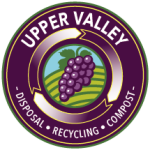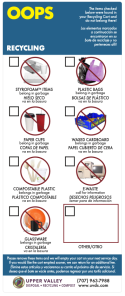Residential Recycling Service
Upper Valley Disposal & Recycling provides a blue cart for the weekly roadside collection of single-stream recyclable items.
As of January 1, 2022, you must sort your recyclables and organic waste including paper, cardboard, yard waste, food scraps, and food soiled paper from the garbage. It’s the law!
BLUE Recycling Cart
- Put only recyclables (empty, clean & dry) into your blue cart. Please do not place food or garbage in the recycling carts.
- Do not overfill; make sure that the lid closes securely when placed at the curb for collection.
- Please place recycling carts at the roadside with the wheels away from the road roadside the night before your collection day. Leave 3 feet between carts and place them 3 feet from cars.
- Materials placed outside of the recycling cart will not be picked up unless you have called the office and arranged for a special collection.
- Recycling carts are only available in the 96-gallon size.
For set out rules and how to stop, start or change service, visit the Residential Services page.
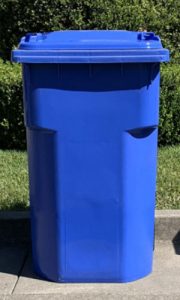
What Belongs in Recycling
Only place recyclable materials that are empty, clean & dry in the recycling cart(s) or bins.
Paper
- Cardboard (must be broken down and placed inside the cart)
- Boxboard (such as shoe boxes, cereal boxes)
- Newspaper
- Magazines, catalogs & glossy paper
- Brown paper bags & paper packaging
- Junk mail
- Phone books & soft-cover books
- Envelopes (labels or windows all okay)
- Office paper (all colors)
- Shredded white paper (in clear plastic bags only)
- Cartons: Milk, juice & tetra pak/aseptic (foil-lined)
Plastic
- Bottles & jugs: all CRV containers; all numbers & colors; rinsed & empty, leave caps on
- Rigid plastic tubs & containers (e.g. yogurt, margarine)
- Rigid plastic buckets, pails & crates
- Rigid plastic clamshell trays & deli containers (please rinse and dry);
- Rigid plastic laundry baskets
Metal
- Scrap metal (36” wide but not smaller than 3”)
- Aluminum cans
- Tin & steel cans
- Clean aluminum pans & foil
- Empty aerosol cans
- Scrap metal (up to 36")
- Pots, pans & utensils
- Loose metal lids from glass jars and bottles
Glass
- Bottles - all colors, lids removed and recycled loose - (labels okay)
- Jars - all colors, lids removed and recycled loose - (labels okay)
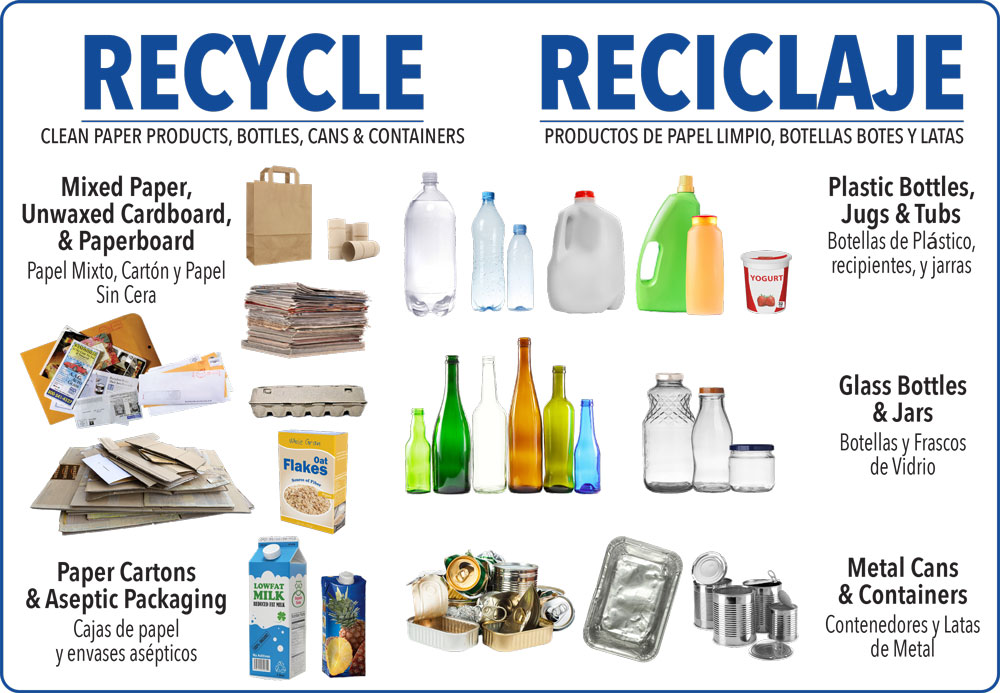
What Doesn’t Belong in Recycling
No food, yard waste, garbage, or household hazardous waste in recycling.
Below are a few of the things that do not belong in your recycling.
- Hardcover books
- Binders
- Food scraps (belong in your Compost Cart)
- Food-soiled paper (belong in your Compost Cart)
- Yard waste & plant trimmings (belong in your Compost Cart)
- Tissues or paper towels
- Paper with plastic coatings (such as photographs or label paper)
- Waxed paper
- Foil-lined paper
- Plastic shipping envelopes
- Electronics (e-waste)*
- Batteries*
*Household Hazardous Waste (HHW) items such as fluorescent light bulbs (CFLs) or tubes, batteries, paint, pesticides, cleaning products or electronics should be taken to the County of Napa HHW Facility.

Recycling Contamination
We know that it can be difficult to determine what materials are recyclable. All materials in the blue carts and recycling bins go to the Upper Valley Recycling Facility where the items are hand sorted and the non-recyclable items (contamination) and are separated from the recyclable materials. Only clean/dry recyclables can be sold to vendors who will turn them into a feedstock that can be used and made into other products.Why Reducing Contamination Matters
Contaminants can have serious negative consequences for a recycling program. Here are just a few examples:- Reduced recycling rates – Contamination can cause materials that would otherwise be recycled to be landfilled. For instance, bottles and cans can get lodged in film wrap or plastic bags and will end up landfilled instead of sorted.
- Lower material values – Contamination will lower the quality of the recyclables, which in turn makes them less valuable and may even make them unsellable.
- Damage to recycling machinery – Not all recycling machinery is equipped to take all types of material. Some items, like plastic film/bags, can jam up sorting equipment if it is put in the recycling container.
- Safety hazards for recycling workers –Medical waste like needles or electronic waste with heavy metals or chemicals can be a very dangerous the health of workers who are in direct contact with these broken items.
What is Recycling Contamination?
Contamination is the term used to describe anything that renders your recycled items non-recyclable. Besides ruining good material, contamination increases labor costs at processing facilities and decreases value of the materials, as workers try to separate contaminated material from good material.Contamination happens when:
- Non-recyclable items are put in collection containers. Often due to “wish-cycling” or hoping the item really can be recycled.
- Food waste or liquids are left on recyclables put in recycling containers.
- Bags of actual garbage is dropped into containers because there is no more room in the garbage cart.
Common recycling contaminants include:
- Plastic bags and packaging (should go into trash)
- Garbage bags (only garbage goes into garbage bags, do not bag your recyclables)
- E-Waste/Batteries (Napa County Household Hazardous Waste Facility)
- Food (should go into your compost cart)
- Styrofoam (should go into trash)
- Diapers (should go into trash)
- Clothing (donate or goes into trash)
How to Prevent Contamination
- Review the list of what materials CAN be recycled. Only recyclable material belongs in your recycling cart.
- To make sure that your recyclables are ready for recycling, please be sure they are: EMPTY, CLEAN and DRY.
- Unfortunately, when in doubt, it’s better to throw it out (in the garbage) than to risk contaminating your recycling cart.
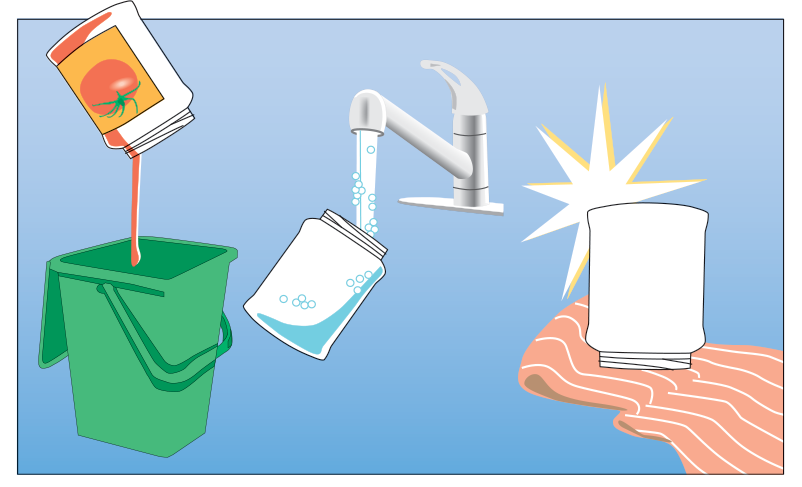
How We Manage Recycling Contamination at UVD&R
Recycle carts WILL NOT be emptied if contaminated with trash or non-recyclable materials.
If the driver notices contamination, he/she may not be able to empty your container. If this happens, a Non-Collection Notice will be left on the container letting you know why the cart was not collected. You will also get an OOPS TAG which will tell you what contamination was found so will know the next time. You will be given the opportunity to clean up the container so it can be emptied on your next service say. Or you may opt to request a special pickup (for a fee) after removing the contaminants from the container.
Missed Collection
We make every effort to emptying your container(s) on your service day, but on occasion, we may miss you. We apologize if this happens.
- If our driver skips collection, please call our office within two business days so we can return at no cost to you.
- If your miss is discovered after office hours, you can leave us a message through our contact form.
- We are all human and may accidently forgot to set-out our containers for collection. If this happens, please call our office hours and let us know. We can offer a one-time courtesy fee waiver and allow you to set out an extra bag the next pick-up day equal to your missed collection without charge. If you cannot wait until the next week to set-out extra garbage, we can go back and empty the cart(s) for an additional $25 per cart and $75 per bin.
- There are other instances when your container(s) may not be emptied. This may be because the container was not out, or it was blocked by something that prevented us from safely emptying it, or the container had prohibited items. If this was the case, we will leave you a notice with instructions on how to correct the problem (such as the cart was not out, the container was blocked, or the contents of the container had prohibited materials). We can return to empty the container for an additional fee per container.
Clover Flat Resource Recovery
Did you know you can also drop off recyclables at Clover Flat?
Bulky Item Pickup
You can call up to two times per year to have us collect bulky items, e-waste and appliances at no cost to you!
Household Hazardous Waste (HHW)
Dispose of materials like batteries, paints and household cleaners properly at the Napa County HHW Facility.
